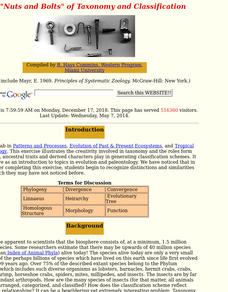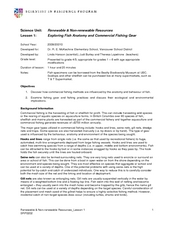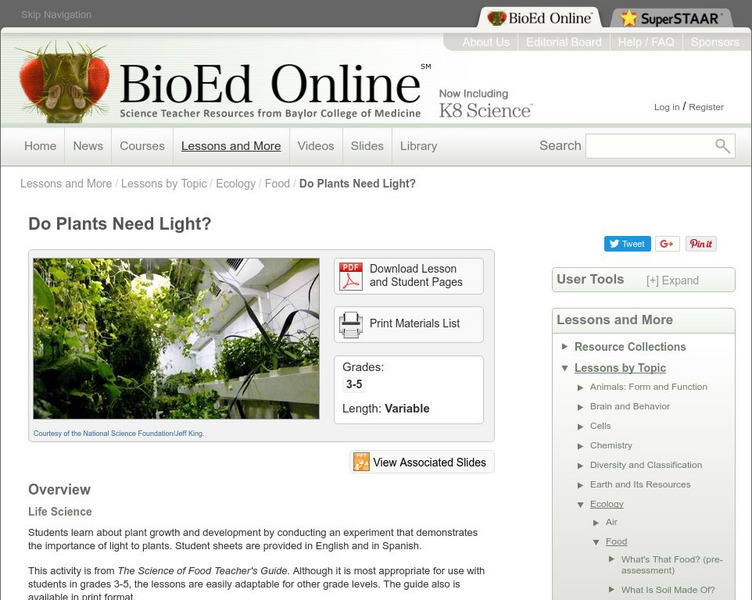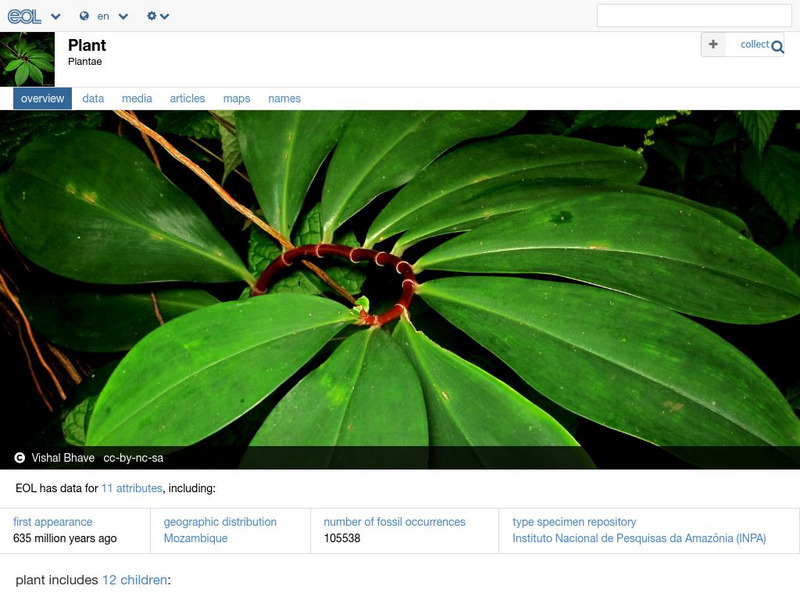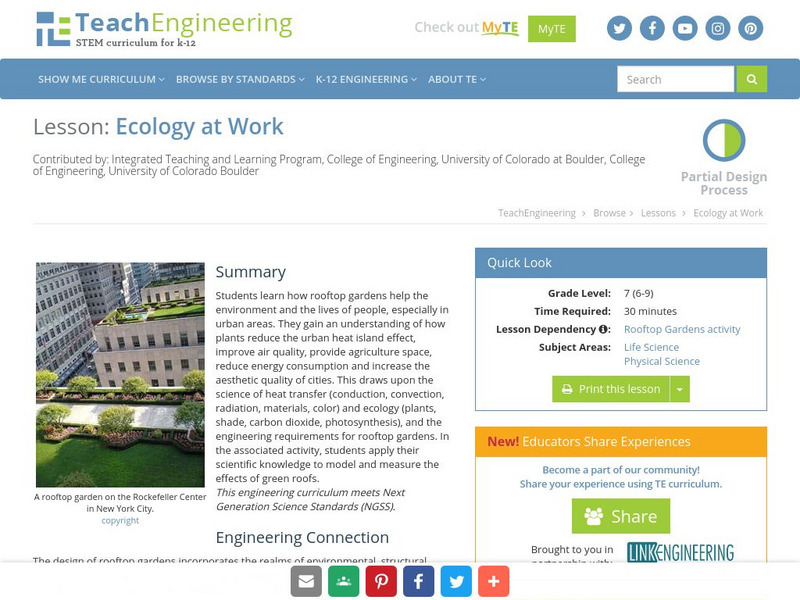Curated OER
The "Nuts and Bolts" of Taxonomy and Classification
Young scholars develop classification scheme that meets the established rules of the Linnaean system. They write one page essay on classification choices.
Curated OER
The Siberian Arctic
High schoolers, in groups, research the topics: habitats of northwestern Siberia, reindeer, oil and natural gas, and other threatened regions of the Arctic. They answer specific research questions based on their topic. They use online...
Curated OER
Language Arts: Five Senses Walk
First graders take a discovery walk around the school. They use their observations to compose a class book about their school.
Curated OER
Spinning the Eco Web
Students examine the components and relationships of ecoregions and ecosystem management. They define ecoregion and ecosystem, list ecoregions, and participate in a simulation that demonstrates the connections between parts of the...
Curated OER
Land Use
Young scholars examine ecosystems that covered Illinois 200 years ago, investigate some living and non-living components of ecosystems, identify components of prairie system, create food webs, and observe human effects on environment....
Curated OER
Give Me Some Air!
Third graders examine how trees produce oxygen. They examine satellite images of the reservation they examining and interpret the number of trees on the land. They determine how natural resources should be used wisely.
Curated OER
Adapted to Fire
Fourth graders explore forest species' adaptations to fire by participating in a scavenger hunt and mapping a burned forest. Students create maps and explore how indigenous species adapted to living with fire.
Curated OER
Who Can Harvest A Walleye?
Seventh graders investigate the concept of how an ecosystem is put together while conducting research using a variety of resources. They correctly differentiate between a herbivore and carnivore by placing them in the order of hierarchy...
Curated OER
Butterfly Lesson
Students identify that Idaho is a home to 168 species of butterflies and they are an important part of many habitats. They also identify how to use the Digital Atlas of Idaho and write a report regarding information of their assigned...
Curated OER
Rainforest Vocabulary
In this vocabulary worksheet, students match vocabulary words on the left with definitions on the right. Worksheet is labeled as a quiz, but may be used for practice/review.
Curated OER
Exploring Fish Anatomy and Commercial Fishing Gear
Students investigate commercial fishing by exploring the technical methods. In this environmental lesson, students identify the fish that are most commonly consumed by humans and trace their path from ocean to plate. Students...
BioEd Online
Bio Ed Online: Do Plants Need Light?
Plants need air, water, soil, and light to grow. Learners learn about plant growth and development by conducting an experiment that demonstrates the importance of light to plants.
Other
Study of Northern Virgina Ecology: Black Carpenter Ant
Lots of information about the black carpenter ant. Learn about their physical characteristics, colonies, life cycle, food sources, and predators. A detailed chart listing many plants and animals permits exploration of their relationships...
Polk Brothers Foundation Center for Urban Education at DePaul University
De Paul University: Center for Urban Education: I Like Plants [Pdf]
"I Like Plants" is a one page, realistic fiction, reading passage about a person who loves plants and became a botanist; now she teaches her college students about plants and ecology. It is followed by constructed-response questions...
Polk Brothers Foundation Center for Urban Education at DePaul University
De Paul University: Center for Urban Education: I Like Plants [Pdf]
"I Like Plants" is a one page, realistic fiction, reading passage about a person who loves plants and became a botanist; now she teaches her college students about plants and ecology. It is followed by constructed-response questions...
Polk Brothers Foundation Center for Urban Education at DePaul University
De Paul University: Center for Urban Education: I Like Plants [Pdf]
"I Like Plants" is a one page, realistic fiction, reading passage about a person who loves plants and became a botanist; now she teaches her college students about plants and ecology. It is followed by constructed-response questions...
Encyclopedia of Life
Encyclopedia of Life: Plants
Thorough resource examines plants with a description, pictures, and maps. Includes facts on ecology, evolution, functional adaptations, and external links.
Other
Ohio Dept. Of Education: Plants and Animals Around the Year
This is a unit for Grade Two where students investigate the plants and animals found in their schoolyard and prepare a poster display.
US Environmental Protection Agency
Epa: Climate Change: Plants, Animals, and Ecosystems
Find out how plants and animals adapt to changes in ecosystems.
Other
Suny Stony Brook: Spartina Salt Marsh Ecology
Good illustrated introduction to Spartina salt marsh ecology. Focus on the grasses and their interactions with each other and the animals that inhabit the marsh.
TeachEngineering
Teach Engineering: Ecology at Work
Students learn how rooftop gardens help the environment and the lives of people, especially in urban areas. They gain an understanding of how plants reduce the urban heat island effect, improve air quality, provide agriculture space,...
PBS
Nova: How Plants Use Fire
Fire is generally regarded as a negative phenomenon. Find out how plants and animals are adapted to survive fires and can even benefit from it.
FT Exploring
Ft Exploring: The Flow of Energy Through Plants and Animals
Explore the different ecological roles of organisms in the ecosystem, and find out how the energy flows through them.
Polk Brothers Foundation Center for Urban Education at DePaul University
De Paul University: Center for Urban Education: Prairie Ecology Questions and Activities [Pdf]
"Prairie Ecology Questions and Activities" is a one page, nonfiction, reading passage about prairie ecology the interdependence of its plants and animals. It is followed by questions which require students to provide evidence from the...


